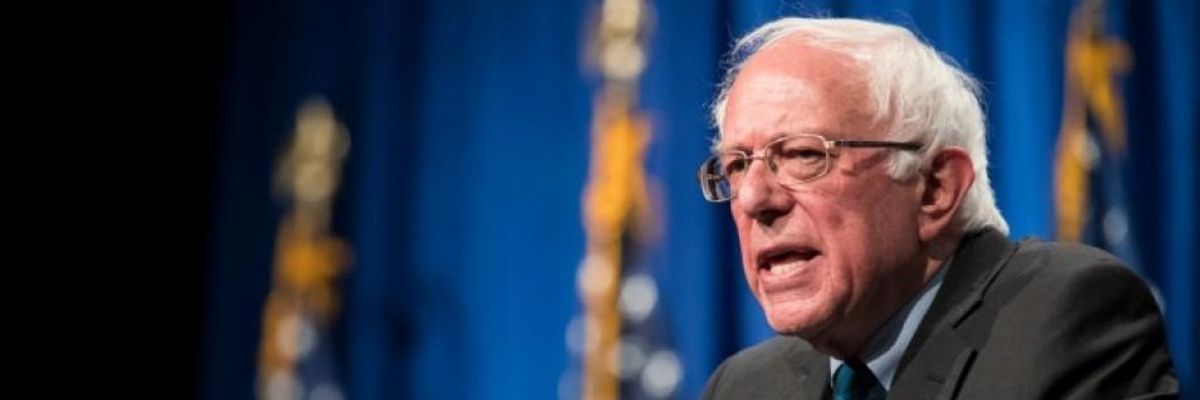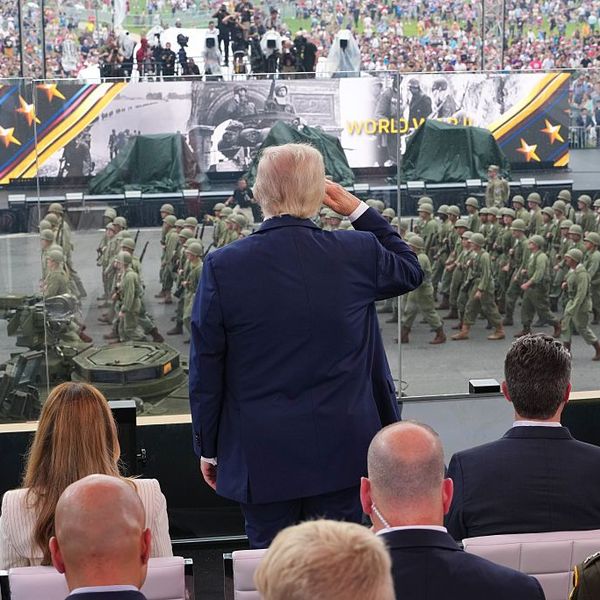
Sanders' commitment to worldwide leftism was apparent even before he announced his second run for president. (Photo: Sarah Silbiger/Getty Images)
Bernie Sanders Has the Backing of Leftists Worldwide
Sanders’ support for international far-left leaders, Politico explains, "are a clear mark of distinction from Warren in a race in which their domestic agendas are viewed as very similar."
Leftist leaders from the United Kingdom to South America have a clear ally in the U.S. presidential election. In a crowded presidential primary, Bernie Sanders has distinguished himself from centrists like Joe Biden and Pete Buttigieg and even fellow progressive Elizabeth Warren by calling the ouster of Bolivia's former President Evo Morales a coup, praising Brazil's former President Luiz Inacio Lula da Silva and drawing parallels between his campaign and mass protests in Chile, Lebanon and Iraq.
Sanders' support for international far-left leaders, Politico explains, "are a clear mark of distinction from Warren in a race in which their domestic agendas are viewed as very similar."
"Bernie is the only candidate who has a comprehensive foreign policy vision to stand up to the growing movement of anti-democratic authoritarianism worldwide and find solidarity with working people around the world who, in many cases, share common needs," Josh Orton, Sanders' national policy director, told Politico.
During a Democratic candidate forum hosted by Spanish-language channel Univision, Sanders said, "I think Morales did a very good job in alleviating poverty and giving the indigenous people of Bolivia a voice that they never had before." Of Morales' ouster, Sanders added, "When the military intervenes ... in my view, that's called a 'coup.' "
Sanders also said that Lula "has done more than anyone to lower poverty in [the country] and to stand up for workers." In 2017, he said he was "very impressed" by UK Labour leader Jeremy Corbyn's campaign, he saw "a real similarity" between their positions, and that he particularly appreciated Corbyn's willingness to take on class issues.
Sanders' commitment to worldwide leftism was apparent even before he announced his second run for president. In one 2017 speech, he called interventions in Asia, the Middle East and Latin America "just a few examples of American foreign policy and interventionism which proved to be counterproductive."
So far, the world leaders appear to return the affection. Morales called him "hermano Bernie Sanders." Lula thanked him for the solidarity.
As Truthdig's Jacob Sugarman has observed about Morales' ouster, "the response of leading Democrats and presidential hopefuls has been one of almost total silence, even among the party's putative progressives." Warren, Sugarman observes, "declined to comment publicly despite the gruesome precedent in the region." Politico points out that a few days after Sanders' initial comments, when pressed by The Young Turks on whether Morales' ouster was a coup, Warren changed her tone and said, it "sure looks like that."
In general, Warren has attempted an "all things to all people" approach on foreign policy. In a 2018 speech at American University, she described America's involvement in international politics thusly: "It wasn't perfect -- we weren't perfect -- but our foreign policy benefited a lot of people around the world."
Read the full Politico story here.
An Urgent Message From Our Co-Founder
Dear Common Dreams reader, The U.S. is on a fast track to authoritarianism like nothing I've ever seen. Meanwhile, corporate news outlets are utterly capitulating to Trump, twisting their coverage to avoid drawing his ire while lining up to stuff cash in his pockets. That's why I believe that Common Dreams is doing the best and most consequential reporting that we've ever done. Our small but mighty team is a progressive reporting powerhouse, covering the news every day that the corporate media never will. Our mission has always been simple: To inform. To inspire. And to ignite change for the common good. Now here's the key piece that I want all our readers to understand: None of this would be possible without your financial support. That's not just some fundraising cliche. It's the absolute and literal truth. We don't accept corporate advertising and never will. We don't have a paywall because we don't think people should be blocked from critical news based on their ability to pay. Everything we do is funded by the donations of readers like you. Will you donate now to help power the nonprofit, independent reporting of Common Dreams? Thank you for being a vital member of our community. Together, we can keep independent journalism alive when it’s needed most. - Craig Brown, Co-founder |
Leftist leaders from the United Kingdom to South America have a clear ally in the U.S. presidential election. In a crowded presidential primary, Bernie Sanders has distinguished himself from centrists like Joe Biden and Pete Buttigieg and even fellow progressive Elizabeth Warren by calling the ouster of Bolivia's former President Evo Morales a coup, praising Brazil's former President Luiz Inacio Lula da Silva and drawing parallels between his campaign and mass protests in Chile, Lebanon and Iraq.
Sanders' support for international far-left leaders, Politico explains, "are a clear mark of distinction from Warren in a race in which their domestic agendas are viewed as very similar."
"Bernie is the only candidate who has a comprehensive foreign policy vision to stand up to the growing movement of anti-democratic authoritarianism worldwide and find solidarity with working people around the world who, in many cases, share common needs," Josh Orton, Sanders' national policy director, told Politico.
During a Democratic candidate forum hosted by Spanish-language channel Univision, Sanders said, "I think Morales did a very good job in alleviating poverty and giving the indigenous people of Bolivia a voice that they never had before." Of Morales' ouster, Sanders added, "When the military intervenes ... in my view, that's called a 'coup.' "
Sanders also said that Lula "has done more than anyone to lower poverty in [the country] and to stand up for workers." In 2017, he said he was "very impressed" by UK Labour leader Jeremy Corbyn's campaign, he saw "a real similarity" between their positions, and that he particularly appreciated Corbyn's willingness to take on class issues.
Sanders' commitment to worldwide leftism was apparent even before he announced his second run for president. In one 2017 speech, he called interventions in Asia, the Middle East and Latin America "just a few examples of American foreign policy and interventionism which proved to be counterproductive."
So far, the world leaders appear to return the affection. Morales called him "hermano Bernie Sanders." Lula thanked him for the solidarity.
As Truthdig's Jacob Sugarman has observed about Morales' ouster, "the response of leading Democrats and presidential hopefuls has been one of almost total silence, even among the party's putative progressives." Warren, Sugarman observes, "declined to comment publicly despite the gruesome precedent in the region." Politico points out that a few days after Sanders' initial comments, when pressed by The Young Turks on whether Morales' ouster was a coup, Warren changed her tone and said, it "sure looks like that."
In general, Warren has attempted an "all things to all people" approach on foreign policy. In a 2018 speech at American University, she described America's involvement in international politics thusly: "It wasn't perfect -- we weren't perfect -- but our foreign policy benefited a lot of people around the world."
Read the full Politico story here.
Leftist leaders from the United Kingdom to South America have a clear ally in the U.S. presidential election. In a crowded presidential primary, Bernie Sanders has distinguished himself from centrists like Joe Biden and Pete Buttigieg and even fellow progressive Elizabeth Warren by calling the ouster of Bolivia's former President Evo Morales a coup, praising Brazil's former President Luiz Inacio Lula da Silva and drawing parallels between his campaign and mass protests in Chile, Lebanon and Iraq.
Sanders' support for international far-left leaders, Politico explains, "are a clear mark of distinction from Warren in a race in which their domestic agendas are viewed as very similar."
"Bernie is the only candidate who has a comprehensive foreign policy vision to stand up to the growing movement of anti-democratic authoritarianism worldwide and find solidarity with working people around the world who, in many cases, share common needs," Josh Orton, Sanders' national policy director, told Politico.
During a Democratic candidate forum hosted by Spanish-language channel Univision, Sanders said, "I think Morales did a very good job in alleviating poverty and giving the indigenous people of Bolivia a voice that they never had before." Of Morales' ouster, Sanders added, "When the military intervenes ... in my view, that's called a 'coup.' "
Sanders also said that Lula "has done more than anyone to lower poverty in [the country] and to stand up for workers." In 2017, he said he was "very impressed" by UK Labour leader Jeremy Corbyn's campaign, he saw "a real similarity" between their positions, and that he particularly appreciated Corbyn's willingness to take on class issues.
Sanders' commitment to worldwide leftism was apparent even before he announced his second run for president. In one 2017 speech, he called interventions in Asia, the Middle East and Latin America "just a few examples of American foreign policy and interventionism which proved to be counterproductive."
So far, the world leaders appear to return the affection. Morales called him "hermano Bernie Sanders." Lula thanked him for the solidarity.
As Truthdig's Jacob Sugarman has observed about Morales' ouster, "the response of leading Democrats and presidential hopefuls has been one of almost total silence, even among the party's putative progressives." Warren, Sugarman observes, "declined to comment publicly despite the gruesome precedent in the region." Politico points out that a few days after Sanders' initial comments, when pressed by The Young Turks on whether Morales' ouster was a coup, Warren changed her tone and said, it "sure looks like that."
In general, Warren has attempted an "all things to all people" approach on foreign policy. In a 2018 speech at American University, she described America's involvement in international politics thusly: "It wasn't perfect -- we weren't perfect -- but our foreign policy benefited a lot of people around the world."
Read the full Politico story here.

